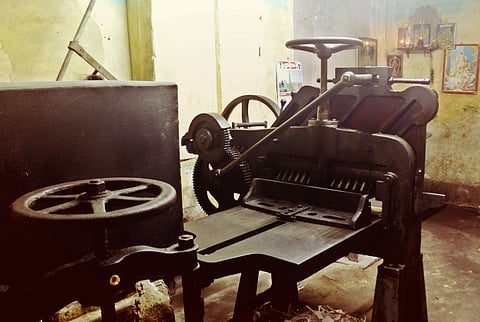

CHENNAI: Inside a shop with faded and peeling green coloured walls, there was a teakwood ceiling that was shining in all its glory.
Amid the ancient binding and printing machines, sits CN Ravamanickam, the third generation owner of Green & Co Parvathi Press, an 83-year-old printing and binding shop. Tucked between other shops on Triplicane High Road, the tiny complex located next to a bus stop is almost invisible to a passerby. As the crowd in front of the shop waits for the approaching bus, we are attracted towards the complex because of its rusted name board with faint shades of blue, red and white on the façade, which reads: ‘Parvathi Press – ESTD 1933’.
“My grandfather, S Chengalvaraya Mudaliar, started the company in 1932, but we received the license only in 1933,” 57-year-old says Manickam, pointing to the photo of his grandfather at the entrance, next to that of his partner, Kanakaroya Mudaliar. “This is the registration document of the building dated 1933 — by the British government,” he adds as he gazes at the fairly tattered sheet of paper, which has been framed as a memoire of the past.
A native of Chengalpattu, Chengalvaraya, worked under Sold & Co, another press in Triplicane after which he headed to Burma and Bombay for work. Following that, he arrived at Madras to set-up his own printing firm, putting his skills to use.
The shop has been in the same location ever since its inception, where the property belonged to the Nawab of Arcot and was a stable for the royal horses.
“Later, the place was made into a shopping complex and my grandfather rented it for `3 per month. Can you imagine a 1,200 sq ft place for that amount!” he grins.
The work was handed over to Manickam’s father Nagalingam in 1950 and the number of people working in the press dwindled from 20 to 10. The reason? Decline in demand for manual prints. “As technology improved, people preferred the computerised prints. Here we used to compose every word by hand, print it on paper, cut and bind it manually,” he recalls and walks us through the type cases in small cabinets covered in thick sheets of dust.
“The types are available in varying sizes and alphabets (English and Tamil). For customers who prefer the manual print, we do it this way. But, 99% people like computer fonts now,” he sighs.
The press has machines that are over 80 years old and have been in the same position since the press started. “This German printing machine can be handled with and without electricity and every other machine here is as old as the press. Even the type cases we use are old and we do recasting to maintain its sharpness,” he says as he picks out the letter ‘m’ made out of lead.
The factories that manufacture these type cases have now closed, and Manickam says that they are used only when a customer gives a special order for manual prints.
Though he gets paid for printing and binding invitation cards, visiting cards, school and office bill books, letter pads and posters, Manickam rues that the earnings from the press is too less to take care of the family. “The profits are spent on the electricity and other bills for the press itself,” he shares.
Currently the press is run only by two people — Manickam and his brother occasionally helping
him.
“We still bind the traditional way and don’t use glue or pins. We give a guarantee of 50 years,” he assures us.
With his children moving to the IT sector, Manickam says that they aren’t interested in the printing business. “I will do this as long as I can. This is a legacy that I wouldn’t think of giving up! We have
had personalities like Anna Durai give orders to us back then,” he recalls, sadly.
Manickam goes back to the wooden chair-table in the front, which was his grandfather’s and father’s seat. It’s his now. Will it have another occupant in the future? “Only time will tell. It’s up to my children,” he says.
For details, call: 28514404